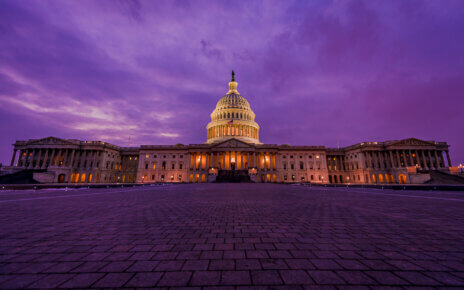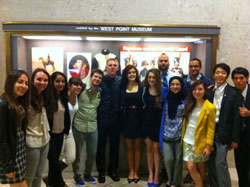The University’s Institute for Global Understanding hosted an informative lecture by Dr. Hussein Ibish, a Senior Fellow at the American Task Force on Palestine (ATFP), columnist for The National (UAE), and author of multiple well-known publications, on Tuesday Nov. 18. Ibish is also a contributing writer for Foreign Affairs and frequently speaks on PBS’s NewsHour.
Ibish began by presenting an overarching theme: the Middle East is not one single entity, nor has it ever been, and the problems that plague it are not necessarily shared from one end of the region to the other. Effectively, he viewed the categorization of uniformity in the Middle East as a central problem that goes unrecognized by many Americans post-Cold War era.
Conversely, Ibish noted the interconnectedness of Middle Eastern states as kaleidoscopic and multi-faceted wherein “one small pattern shifts and the entire picture re-arranges itself.”
According to Ibish, one could spend an entire academic career examining one street battle in Kobani in Northern Syria and not exhaust the subject – analytically, philosophically, etc… “We need to widen the aperture, step back for a second and look at very big picture,” he said, “specifying that changes in the Middle East are often very closely linked together.”
Ibish dove into the subject by portraying the beginnings of the Arab Spring in 2011 and addressing the downfall of Hosni Mubarak in Egypt, a move that angered some of the Gulf States. He addressed the Syrian Conflict, citing it to have claimed between 200,000 and 400,000 lives, producing up to as many as 7,000,000 displaced refugees since the inception of civil unrest.
He noted these changes to be potentially destructive and therefore alarming. Ibish mentions unorganized street protests in Syria that have begun as peaceful that have catastrophically morphed into violent displays of rebellion – rebellion that became revolution. “Libya clearly had a revolution. I don’t believe there was one in Tunisia or Egypt or anywhere else,” says Ibish.
The speaker discussed a transformative process which he said will alter [the Middle East and North Africa’s] strategic landscape for decades to come and affect the globe as well. Ibish explained regional changes due to its wealth of resources, its globally-prime location, and the influential political power of small, representative conflicts like the Israeli-Palestinian Conflict. He noted the conflict to be charged emotionally by people all over the world, though objectively smaller in size than the Syrian conflict; he argued it to extend so far as to the future of Sunni-Shi’ia relations in years to come.
He explained that the involvement of greater powers in the affairs of smaller ones greatly influences the outcomes of events, including rivalries and cooperation efforts; “It can’t just be the local realities, it has to include the regional ones, as well,” says Ibish. He noted a prime example to include the issue of Qatar funding Libyan Islamists, quite heavily – they’re quite dependent on Qatari funding. “We’ve gone so far as to directly intervene with air power by bombing Libyan Islamists.”
He addressed the barrier between the Arab world and Iran, a Persian state. A direct consequence of the 2003 American Invasion of Iraq, Iran now enjoys much greater power in the region, so much that it is a virtually dominant player in as many as four capital cities in the modern Middle East. Ibish then intertwined this consequence with the belief that although sometimes counter-intuitive, external influences can be a greater determining factor in the outcome of an event than internal action, and they’re not always predictable.
Ibish jumped topics to Syria’s Bashar Al-Assad as almost benefitting the Islamic State, and vice-versa – feeding off of each other, portraying the other as the more evil party. The two forces have ‘teamed up’ in essence to utilize each other as a ‘boogeyman,’ noted Ibish. “Maybe you don’t like me, but the alternative is monsters.” He alluded this not to necessarily be detrimental, but also not productive, and then connected ISIS (ISIL) to other jihadist networks.
“The rise of the violent extremists has pushed [regional] leaders together,” said Ibish. In other occurrences, these leaders have come together and agreed to disagree, but have placed a value to the other’s perspective, treating each other as if they were legitimate players in national conversations. This transforms virtually everything and has, at times stood for the rational basis of a coalition government. “The politics of compromise serve the interests of [both parties],” he stated, arguing Libya to have unsuccessfully implemented such a change, noting their two separate governments with separate armies, since neither side has recognized each other as fundamentally legitimate.
After discussing Sunni-Shi’ia relations and drawbacks, Ibish enforces that the notion of compromise and the ability to agree to disagree will be the driving cause for change. He dispeled rumors that a jihad will be the source of the Middle East’s collective change, and instead reinforced that the rule of law, the respect for fundamental human rights, will bring about the global success of the Middle East in future generations to come.
Monmouth University Associate Vice-President for Global Initiatives and political science Professor Saliba Sarsar, addressed solutions to halting terrorist organizations, be them state-sponsored or independent non-state actors. He said, “Within religious conflicts, there are religious answers – but there are also political answers.”
In regard to ISIS, the US has an obligation to bring about better conditions to the area, but not necessarily with boots on the ground, argued Sarsar. Although Sarsar does advocate for continued military intervention against IS, Sarsar wishes for political intervention, noting the main task to be a brokerage of peace. “The end goal is really to promote human dignity and to make people feel part of society rather than as outsiders…and that should be done regionally and globally. Not everything has a military solution.” In agreement with Ibish’s discussion, he notes adherence to fundamental human rights as substantially lacking in the region. “When you are treated as a citizen, you are under the rule of law – so how do we create good governance where there is respect for human life, for rule of law? We [need to] bring about a pluralistic society where people are respected for who they are not what they bring to the table.
Business major Andrew Atalla, a junior with Egyptian-born parents, was asked what he personally felt was the underlying cause for issues in the Middle East. Atalla responded, “It’s who are your allies and who’s not…that’s always been the problem…and it’s often an issue of religion,” said Atalla.
Robert Rasinski, an adjunct criminal justice professor said, “[the affected regions as well as the US] have to collaborate with other government agencies…you have to find out who’s going to back you.” Rasinski continued, “Without that, you’ve got nothing.” Rasinski argued that what the United States truly needs is a stronger presence diplomatically in the region that can bring about peace on both political and military fronts.
Rasinski then discussed solutions to stop the funding of terror networks by what NBC News calls ‘Angel Investors,’ wealthy Saudi and Qatari businessmen that fund terrorist groups illegally. Rasinski stressed, “The United States needs to open a dialogue with these nations and discuss with them tactics that [the US] has implemented (since 9/11), including strict border security checkpoints, x-ray machines, bag checks, bank account tracking and tracing, etc.” The problem will not fix itself. The West needs to compel these states to do it.
“The United States is obliged to use its influence to inspire or even compel progression [in affected areas]. The United States has a responsibility to act as a leader, globally. They have an obligation to promote individual rights, elections, and responsibilities of the people and of the government,” stressed Sarsar. Sarsar finshed by noting that once the rule of law is established across the region, solutions will truly begin to expose themselves.
{fcomment}



